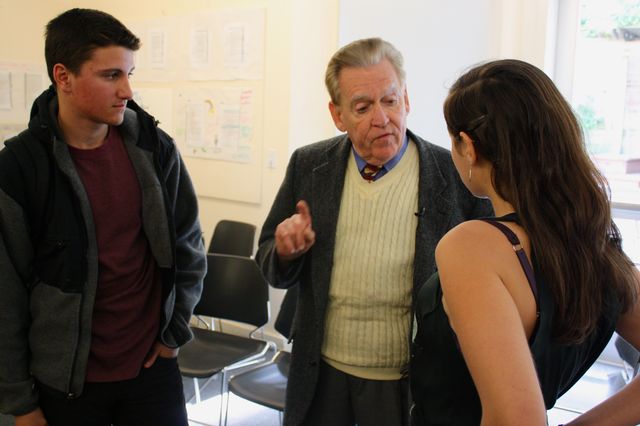The Urban School is poised to become the first school in the nation to offer HIV testing to its students, with the senior class set to be tested on Feb. 11.
Oliver Hamilton, (’11), organized the testing for his senior project, with help from The Conant Foundation. The foundation works to provide educational support around sexually transmitted disease, including a “Teens for Testing” program.
HIV is not the virus it used to be. Dr. Marcus A. Conant, a leader first in diagnosing and now in working to prevent HIV/AIDS, said of the new cases of HIV, “27 percent are in women” and of that “40 percent are in girls ages 15 to 20.”
“The disease is going to young people and girls,” Conant said.
Hamilton says that with the growth of AIDS, people who are “not gay and who don’t do drugs” are at risk, making this testing “relevant” for Urban’s senior class.
In the 1970s, when Conant and other doctors first began working with HIV, there were no treatments for people infected with HIV/AIDS. For years afterwards, many people chose not to get tested for fear of a positive diagnosis- essentially a death sentence.
However, while there still is no cure for HIV, today there are effective treatments that can prolong lives and prevent HIV from developing into AIDS.
People with AIDS are now living longer, thanks to recent progress in treating HIV. In fact, Dr. Susan Scheer, Director of HIV Epidemiology for the San Francisco Department of Public Health and a parent of an Urban student, said that this year for the “first time ever over 50 percent of the people living in San Francisco with AIDS are over the age of 50.”
At the same time, “it is estimated that 25 percent of people in the United States with HIV do not know they are positive,” Scheer said, adding that “living with an unknown HIV infection delays lifesaving treatments and creates the possibility that one could unknowingly transmit their infection to someone else.”
At a Feb. 4 forum to discuss the upcoming testing at Urban, students discussed the positive and negative sides of the testing.
Some worried students would be pressured to talk about their test results. Caitlin Iglehart (’11) talked about making sure that after the tests, students would “respect the privacy” of others. “We need to remind each other that testing is a private thing,” said Isabel Semler (’11). Students at the forum stressed the fact that the confidentiality of these results should not be disrespected, and it should be made clear that the matter of AIDS/HIV testing is far more serious the casual piece of gossip traded in your average high school conversation.
The tests will be taken using a RAPID Oral Swab HIV test and students will participate in a mandatory counseling session on Feb. 8 to prepare.
Others say making testing more openly should be the priority. “By making the testing universal in the class, it shows people that they do not need to feel embarrassed about getting tested,” said Alex Verdoia (’11).
In the Jan. 4 forum at Urban, Conant urged students to “not talk about” test results.
He stressed the importance of testing to prevent death and stop the spread of infections. “If you had sex, or are going to have sex, that’s a reason to get tested,” he said.
Students who wished to participate had to sign a consent form. The form included provisions for confidentiality and notification by phone within 24 hours if the test was positive. The consent form also ensured that students would get help if they were found to be positive and let students withdraw their consent to the form at any time after signing.


